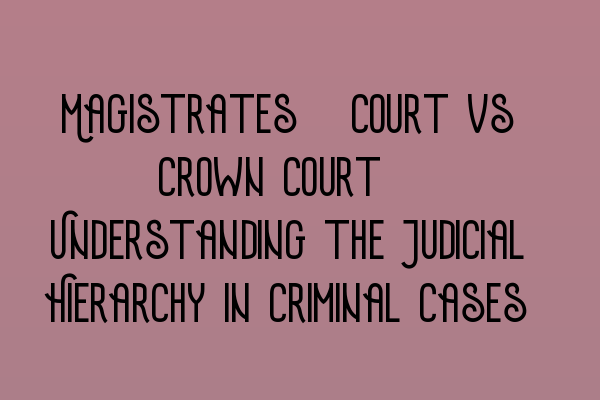Magistrates’ Court vs Crown Court: Understanding the Judicial Hierarchy in Criminal Cases
When it comes to criminal cases in the UK, understanding the judicial hierarchy is crucial. Two key courts in the criminal justice system are the Magistrates’ Court and the Crown Court. Each court has its own functions, powers, and procedures. In this article, we will explore the differences between these two courts and shed some light on their roles in the legal landscape.
The Magistrates’ Court
The Magistrates’ Court, also known as the Summary Court, is the lower court in the criminal justice system. It deals with less serious criminal offenses and has limited jurisdiction. The court is presided over by magistrates who are often non-professional judges. They are known as justices of the peace and are local community members who volunteer their time to serve in this role.
The Magistrates’ Court handles a wide range of cases, including minor offenses such as theft, public order offenses, and traffic violations. They also play a pivotal role in the preliminary stages of more serious cases, known as indictable offenses, which must be passed on to the Crown Court for trial.
The proceedings in the Magistrates’ Court are usually less formal compared to the Crown Court. The court aims to ensure a fair and expedient process for defendants and operates with simple rules of evidence. The emphasis is on resolving cases promptly, as the court handles a significant volume of cases on a daily basis.
If a defendant is found guilty in the Magistrates’ Court, they may face penalties such as fines, community service orders, or short custodial sentences. However, the court’s powers are limited in terms of the severity of sentences it can impose. For more serious offenses, the case is usually referred to the Crown Court for sentencing.
The Crown Court
The Crown Court is the higher court in the criminal justice system and has more extensive powers and jurisdiction compared to the Magistrates’ Court. It deals with more serious criminal offenses such as murder, rape, and drug trafficking. The court is presided over by professional judges, who are known as circuit judges or recorders.
The Crown Court is where cases are heard for trial if they are classified as “indictable offenses” or if the defendant has elected for a jury trial. The court examines evidence presented by both the prosecution and the defense and ultimately decides on the guilt or innocence of the defendant. If the defendant is found guilty, the court also determines the appropriate sentencing.
The Crown Court follows more formal procedures, including strict rules of evidence and legal representation for both the prosecution and the defense. The court’s decision in a case is considered final unless the defendant or the prosecution decides to appeal to a higher court.
Unlike the Magistrates’ Court, the Crown Court has the power to impose longer prison sentences and fines. The severity of the sentence depends on the nature of the offense and any aggravating or mitigating factors present in the case. In some cases, the court may also grant conditional discharges, community orders, or suspended sentences.
The Judicial Hierarchy
Understanding the judicial hierarchy is important as it determines the path a criminal case follows. The Magistrates’ Court plays a vital role in the initial stages of a case, from making the first appearance to conducting bail hearings and pre-trial hearings. If the case proceeds to trial, it is then transferred to the Crown Court.
It’s worth noting that not all cases start in the Magistrates’ Court. Some cases are more serious and thus get sent directly to the Crown Court for trial. It is the Crown Court’s responsibility to handle these cases from start to finish.
Overall, the judicial hierarchy in criminal cases can be summarized as follows:
- Summary Offenses – Heard in the Magistrates’ Court
- Indictable Offenses (Preliminary Stages) – Heard in the Magistrates’ Court but transferred to the Crown Court for trial
- Indictable Offenses (Trial) – Heard in the Crown Court
Understanding the role and jurisdiction of each court is crucial for anyone involved in or curious about the criminal justice system in the UK. They play distinct roles in ensuring a fair and efficient process for all parties involved.
If you’re planning to pursue a career in criminal law, it’s essential to have a thorough understanding of the workings of both the Magistrates’ Court and the Crown Court. Proper legal education and exam preparation courses, such as the SQE 1 Preparation Courses and SQE 2 Preparation Courses, can provide the knowledge and skills needed to succeed in this field.
For those preparing for the SQE exams, it’s recommended to practice with the SQE 1 Practice Exam Questions and SQE 1 Practice Mocks FLK1 FLK2. These resources will help reinforce your understanding of criminal law and improve your chances of passing the exams.
To stay updated with the latest exam dates and regulatory information, refer to the SRA SQE Exam Dates provided by the Solicitors Regulation Authority (SRA). Knowing the exam schedule well in advance will allow you to plan your studies effectively.
Understanding the judicial hierarchy and the role of each court is vital for anyone involved in or studying criminal law. Whether you aspire to become a solicitor or barrister, or simply have a general interest in the legal system, knowing the difference between the Magistrates’ Court and the Crown Court will enrich your understanding of criminal justice in the UK.
